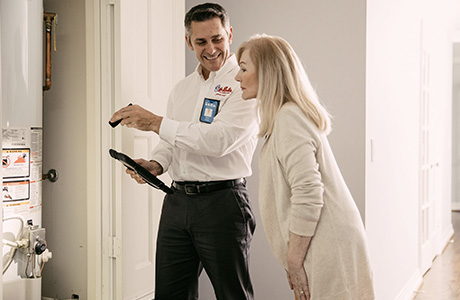Schedule a Plumber This Saturday to Get 50$ OFF
Schedule a Plumber This Saturday to Get 50$ OFF

Selecting the proper water heater is an integral component of home maintenance and upgrades, providing hot water for showering, laundry, and dishwashing - something we take for granted daily! However, choosing a water heater replacement can be daunting due to all the different varieties and power sources available. This guide by Mr. Rooter Plumbing is to ease that decision-making process by exploring each fuel/power source available and discussing its associated pros/cons.
Pros:
Cons:
Pros:
Cons:
Pros:
Cons:
Pros:
Cons:
Pros:
Cons:
Pros:
Cons:
Pros:
Cons:
Pros:
Cons:
Pros:
Cons:
When purchasing a water heater, keep several things in mind, such as household size, budget, and environmental preferences when making a selection. Furthermore, consider any long-term operational costs related to different models or fuel sources before making a final choice.
No matter your water heater's size or power source, professional installation and regular maintenance by an experienced plumber are crucial for safe operation and extended longevity. Regular service calls by plumbing services will prolong its life while improving efficiency and helping prevent unexpected breakdowns and unexpected costs.
Licensed plumbers should always carry out Professional Water heater installation and replacement to ensure effective and safe operation in your home. They will also handle all aspects of installation involving gas lines, electrical wiring, or venting systems, if applicable.
Regular water heater maintenance by an established plumbing service provider is critical to its longevity and performance, helping detect any potential issues early and avoiding expensive repairs or replacement costs. These professionals are your allies for long-term success with your water heater!
Selecting an effective water heater requires researching its various types and power sources, taking account of your requirements, enlisting professional installation services for installation and ongoing maintenance, and making informed decisions with professional help to enjoy an efficient hot water supply in your home. By partnering with Mr. Rooter Plumbing, you can enjoy uninterrupted hot water service delivery for years.
In addition to being a crucial component of every home's plumbing system, sewer lines are also frequently disregarded because they are out of sight. Nonetheless, they shouldn’t’ be out of…
When to Get a Drain Replacement Have you ever considered what happens to the water after using it? Water gets drained through our drains, but what happens…
Common Issues That Indicate You Need a Toilet Repair Noticing problems with the toilets is relatively easier since it’s one of the most commonly used fixtures inside…